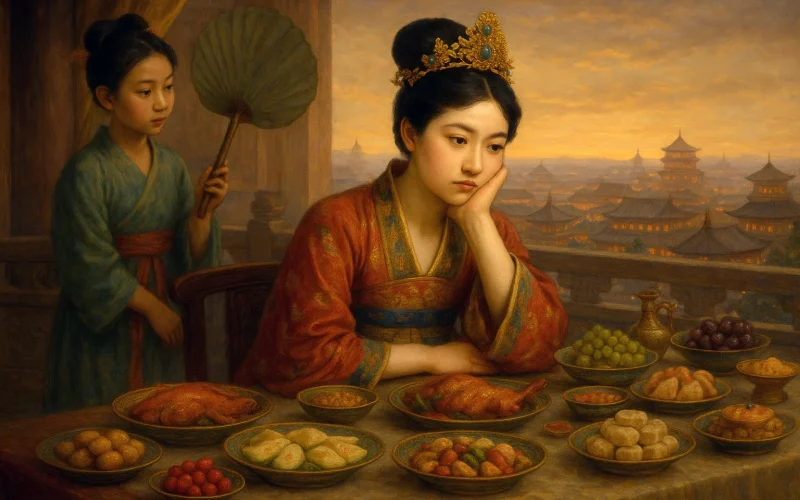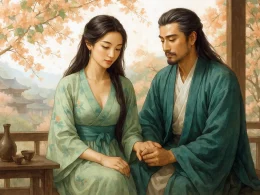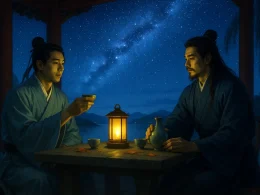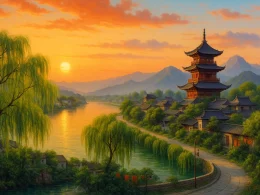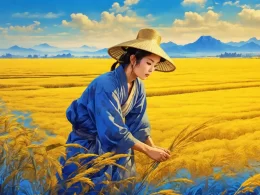There's a girl from Loyang in the door across the street,
She looks fifteen, she may be a little older.
...While her master rides his rapid horse with jade bit an bridle,
Her handmaid brings her cod-fish in a golden plate.
On her painted pavilions, facing red towers,
Cornices are pink and green with peach-bloom and with willow,
Canopies of silk awn her seven-scented chair,
And rare fans shade her, home to her nine-flowered curtains.
Her lord, with rank and wealth and in the bud of life,
Exceeds in munificence the richest men of old.
He favours this girl of lowly birth, he has her taught to dance;
And he gives away his coral-trees to almost anyone.
The wind of dawn just stirs when his nine soft lights go out,
Those nine soft lights like petals in a flying chain of flowers.
Between dances she has barely time for singing over the songs;
No sooner is she dressed again than incense burns before her.
Those she knows in town are only the rich and the lavish,
And day and night she is visiting the hosts of the gayest mansions.
...Who notices the girl from Yue with a face of white jade,
Humble, poor, alone, by the river, washing silk?
Original Poem
「洛阳女儿行」
王维
洛阳女儿对门居,才可容颜十五余。
良人玉勒乘骢马,侍女金盘脍鲤鱼。
画阁朱楼尽相望,红桃绿柳垂檐向。
罗帷送上七香车,宝扇迎归九华帐。
狂夫富贵在青春,意气骄奢剧季伦。
自怜碧玉亲教舞,不惜珊瑚持与人。
春窗曙灭九微火,九微片片飞花璅。
戏罢曾无理曲时,妆成祇是薰香坐。
城中相识尽繁华,日夜经过赵李家。
谁怜越女颜如玉,贫贱江头自浣纱。
Interpretation
Composed in 718 AD when Wang Wei was eighteen, this poem exposes the extravagance, debauchery and spiritual emptiness of aristocratic life through its portrayal of a Luoyang noblewoman and her husband's licentious behavior. The work demonstrates the young poet's early social consciousness and contains implicit criticism of elite decadence.
First Couplet: "洛阳女儿对门居,才可容颜十五余。"
Luòyáng nǚ'ér duìmén jū, cái kě róngyán shíwǔ yú.
The Luoyang maiden lives across the way,/ Just fifteen years with beauty bright.
This establishes the protagonist's youth and beauty, situating her in Luoyang—the prosperous Tang capital—as a privileged socialite.
Second Couplet: "良人玉勒乘骢马,侍女金盘脍鲤鱼。"
Liángrén yù lè chéng cōngmǎ, shìnǚ jīn pán kuài lǐyú.
Her lord rides a blue-maned steed with jade reins,/ Maids serve carp slices on golden trays.
The husband's jade-adorned horse and servants' golden dishes symbolize extreme wealth, with "kuài carp" being a legendary delicacy of the elite.
Third Couplet: "画阁朱楼尽相望,红桃绿柳垂檐向。"
Huà gé zhū lóu jìn xiāngwàng, hóng táo lǜ liǔ chuí yán xiàng.
Painted towers and vermilion mansions stand row on row,/ With red peaches and green willows draping eaves.
The architectural description creates a saturated color palette (vermilion/red/green) reflecting aristocratic opulence, where nature is artificially arranged as decoration.
Fourth Couplet: "罗帏送上七香车,宝扇迎归九华帐。"
Luó wéi sòng shàng qī xiāng chē, bǎo shàn yíng guī jiǔ huá zhàng.
Silken curtains usher her into seven-spice carriage,/ Precious fans welcome her back to nine-flower bedchamber.
The parallelism between departure ("usher") and return ("welcome") rituals emphasizes the cyclical emptiness of aristocratic routines. "Seven-spice" and "nine-flower" represent peak luxury goods.
Fifth Couplet: "狂夫富贵在青春,意气骄奢剧季伦。"
Kuángfū fùguì zài qīngchūn, yìqì jiāoshē jù Jì Lún.
Her profligate lord enjoys wealth in youth's prime,/ His arrogant extravagance surpasses Shi Chong's.
The historical allusion to Shi Chong (石崇), the Jin dynasty epitome of decadence, serves as superlative condemnation of the husband's behavior.
Sixth Couplet: "自怜碧玉亲教舞,不惜珊瑚持与人。"
Zì lián bìyù qīn jiào wǔ, bùxī shānhú chí yǔ rén.
She preens like jade while teaching dances herself,/ Thoughtlessly gives away coral treasures.
The noblewoman's narcissism ("preens like jade") and casual wastefulness ("coral treasures") reveal spiritual bankruptcy beneath material abundance.
Seventh Couplet: "春窗曙灭九微火,九微片片飞花琐。"
Chūn chuāng shǔ miè jiǔ wēi huǒ, jiǔ wēi piànpiàn fēi huā suǒ.
Dawn extinguishes nine-wick lamps by spring windows,/ Wick fragments fly like flower petals.
The extravagant "nine-wick lamps" burning till dawn suggest all-night revelry, while the dying embers ("wick fragments") symbolize fading vitality.
Eighth Couplet: "戏罢曾无理曲时,妆成祇是薰香坐。"
Xì bà céng wú lǐ qǔ shí, zhuāng chéng zhǐ shì xūn xiāng zuò.
After games, no time for proper music,/ Made up, she just sits perfuming herself.
The couplet's lethargic rhythm mirrors the noblewoman's existential inertia—cosmetics and incense replacing genuine culture or purpose.
Ninth Couplet: "城中相识尽繁华,日夜经过赵李家。"
Chéng zhōng xiāngshí jìn fánhuá, rìyè jīngguò Zhào Lǐ jiā.
All her urban acquaintances live in splendor,/ Daily visiting Zhao and Li households.
"Zhao and Li" metaphorically references Emperor Cheng of Han's notorious consorts (Zhao Feiyan and Li Ping), implying the noblewoman's circle consists entirely of decadent elites.
Tenth Couplet: "谁怜越女颜如玉,贫贱江头自浣纱。"
Shéi lián Yuè nǚ yán rú yù, pínjiàn jiāng tóu zì huàn shā.
Who pities the Jiangxi girl fair as jade,/ Poor and lowly, washing silk by the river?
The sudden contrast with the "Jiangxi girl" (alluding to the legendary beauty Xi Shi before her discovery) delivers the poem's moral critique: true worth goes unrecognized while shallow extravagance flourishes.
Holistic Appreciation
Wang Wei constructs a damning portrait of Tang aristocracy through cinematic detail—from jade horse bridles to dying lamp wicks. The first eight couplets systematically expose material excess, while the last two deliver a masterstroke of social commentary. By juxtaposing the noblewoman's empty luxuries against the unrecognized Jiangxi girl's natural beauty and labor, the eighteen-year-old poet demonstrates remarkable moral clarity and technical maturity.
Artistic Merits
Wang Wei employs meticulous depictions of daily life and sophisticated rhetorical devices in this poem. Through vivid portrayals of domestic scenes, he reveals both the opulence and spiritual void of his subjects. The work frequently utilizes contrast and antithesis - most strikingly in the juxtaposition of the Luoyang noblewoman's wealth against the Jiangxi girl's poverty - to expose the hollowness beneath aristocratic splendor. Structurally, the poet masterfully interweaves intimate lifestyle details with broader social commentary, simultaneously showcasing extravagant living while exposing its accompanying existential emptiness.
Insights
The poem's critique of wealth inequality and performative luxury remains startlingly relevant. Wang Wei exposes how privilege breeds not just material excess but spiritual atrophy—a warning to our age of influencer culture and conspicuous consumption. The Jiangxi girl's unseen dignity speaks to all marginalized talents in societies obsessed with surface glamour.
Poem translator
Kiang Kanghu
About the poet

Wang Wei (王维), 701 - 761 A.D., was a native of Yuncheng, Shanxi Province. Wang Wei was a poet of landscape and idylls. His poems of landscape and idylls, with far-reaching images and mysterious meanings, were widely loved by readers in later generations, but Wang Wei never really became a man of landscape and idylls.





